#japanese language translation
Explore tagged Tumblr posts
Text

Japanese Language Translation Benefits for Business! Japanese translation services are essential for businesses that want to tap into the Japanese market. Companies can ensure that their materials are accurately translated and culturally appropriate by working with a professional language service provider. This can help businesses to expand their reach and build strong relationships with their Japanese counterparts. Japanese language translation can help businesses improve their brand image and customer satisfaction.
Get a free quote today! [email protected] For more about our services, Visit Our Website: https://www.delshlanguageconsultancy.com/portfolio/japanese-language-translation-benefits-for-business/
0 notes
Text
Gendered pronouns in Japanese vs English
In Revolutionary Girl Utena, the main character Utena is a girl (it says so in the title), but very conspicuously uses the masculine first person pronoun 僕 (boku) and dresses in (a variation of) the boys school uniform. Utena's gender, and gender in general, is a core theme of the work. And yet, I haven’t seen a single translation or analysis post where anyone considers using anything other than she/her for Utena when speaking of her in English. This made me wonder: how does one’s choice of pronouns in Japanese correspond to what one’s preferred pronouns would be in English?

There are 3 main differences between gendered pronouns in Japanese vs English
Japanese pronouns are used to refer to yourself (first-person), while English pronouns are used to refer to others (third-person)
The Japanese pronoun you use will differ based on context
Japanese pronouns signify more than just gender
Let’s look at each of these differences in turn and how these differences might lead to a seeming incongruity between one’s Japanese pronoun choice and one’s English pronoun choice (such as the 僕 (boku) vs she/her discrepancy with Utena).
Part 1: First-person vs third-person
While Japanese does technically have gendered third person pronouns (彼、彼女) they are used infrequently¹ and have much less cultural importance placed on them than English third person pronouns. Therefore, I would argue that the cultural equivalent of the gender-signifying third-person pronoun in English is the Japanese first-person pronoun. Much like English “pronouns in bio”, Japanese first-person pronoun choice is considered an expression of identity.
Japanese pronouns are used exclusively to refer to yourself, and therefore a speaker can change the pronoun they’re using for themself on a whim, sometimes mid-conversation, without it being much of an incident. Meanwhile in English, Marquis Bey argues that “Pronouns are like tiny vessels of verification that others are picking up what you are putting down” (2021). By having others use them and externally verify the internal truth of one’s gender, English pronouns, I believe, are seen as more truthful, less frivolous, than Japanese pronouns. They are seen as signifying an objective truth of the referent’s gender; if not objective then at least socially agreed-upon, while Japanese pronouns only signify how the subject feels at this particular moment — purely subjective.
Part 2: Context dependent pronoun use
Japanese speakers often don’t use just one pronoun. As you can see in the below chart, a young man using 俺 (ore) among friends might use 私 (watashi) or 自分 (jibun) when speaking to a teacher. This complicates the idea that these pronouns are gendered, because their gendering depends heavily on context. A man using 私 (watashi) to a teacher is gender-conforming, a man using 私 (watashi) while drinking with friends is gender-non-conforming. Again, this reinforces the relative instability of Japanese pronoun choice, and distances it from gender.

Part 3: Signifying more than gender
English pronouns signify little besides the gender of the antecedent. Because of this, pronouns in English have come to be a shorthand for expressing one’s own gender experience - they reflect an internal gendered truth. However, Japanese pronoun choice doesn’t reflect an “internal truth” of gender. It can signify multiple aspects of your self - gender, sexuality, personality.
For example, 僕 (boku) is used by gay men to communicate that they are bottoms, contrasted with the use of 俺 (ore) by tops. 僕 (boku) may also be used by softer, academic men and boys (in casual contexts - note that many men use 僕 (boku) in more formal contexts) as a personality signifier - maybe to communicate something as simplistic as “I’m not the kind of guy who’s into sports.” 俺 (ore) could be used by a butch lesbian who still strongly identifies as a woman, in order to signify sexuality and an assertive personality. 私 (watashi) may be used by people of all genders to convey professionalism. The list goes on.
I believe this is what’s happening with Utena - she is signifying her rebellion against traditional feminine gender roles with her use of 僕 (boku), but as part of this rebellion, she necessarily must still be a girl. Rather than saying “girls don’t use boku, so I’m not a girl”, her pronoun choice is saying “your conception of femininity is bullshit, girls can use boku too”.

Through translation, gendered assumptions need to be made, sometimes about real people. Remember that he/they, she/her, they/them are purely English linguistic constructs, and don’t correspond directly to one’s gender, just as they don’t correspond directly to the Japanese pronouns one might use. Imagine a scenario where you are translating a news story about a Japanese genderqueer person. The most ethical way to determine what pronouns they would prefer would be to get in contact with them and ask them, right? But what if they don’t speak English? Are you going to have to teach them English, and the nuances of English pronoun choice, before you can translate the piece? That would be ridiculous! It’s simply not a viable option². So you must make a gendered assumption based on all the factors - their Japanese pronoun use (context dependent!), their clothing, the way they present their body, their speech patterns, etc.
If translation is about rewriting the text as if it were originally in the target language, you must also rewrite the gender of those people and characters in the translation. The question you must ask yourself is: How does their gender presentation, which has been tailored to a Japanese-language understanding of gender, correspond to an equivalent English-language understanding of gender? This is an incredibly fraught decision, but nonetheless a necessary one. It’s an unsatisfying dilemma, and one that poignantly exposes the fickle, unstable, culture-dependent nature of gender.

Notes and References
¹ Usually in Japanese, speakers use the person’s name directly to address someone in second or third person
² And has colonialist undertones as a solution if you ask me - “You need to pick English pronouns! You ought to understand your gender through our language!”
Bey, Marquis— 2021 Re: [No Subject]—On Nonbinary Gender
Rose divider taken from this post
#langblr#japanese#japanese language#language#language learning#linguistics#learning japanese#utena#revolutionary girl utena#shojo kakumei utena#rgu#sku#gender#transgender#nonbinary#trans#official blog post#translation#media analysis
2K notes
·
View notes
Text





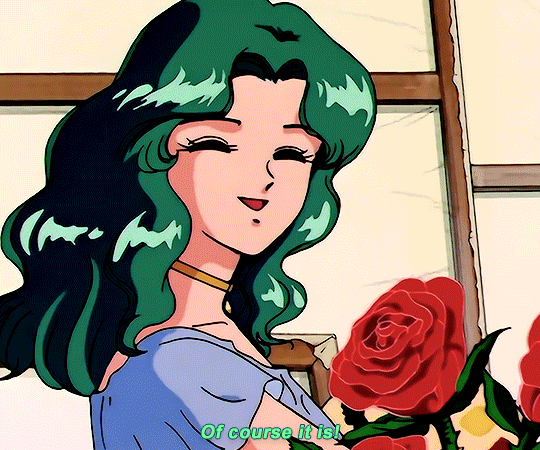
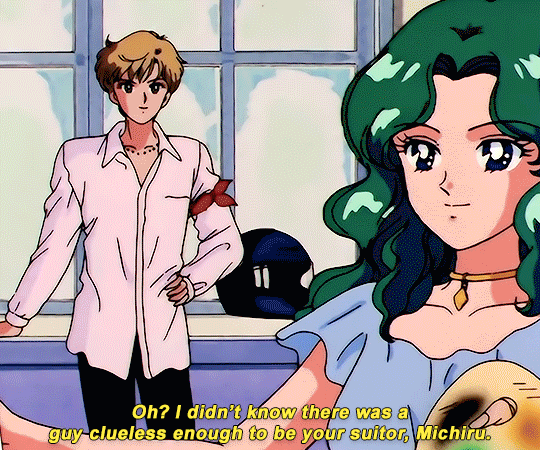
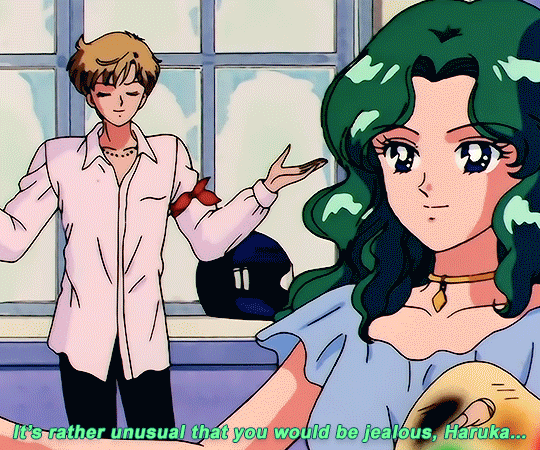
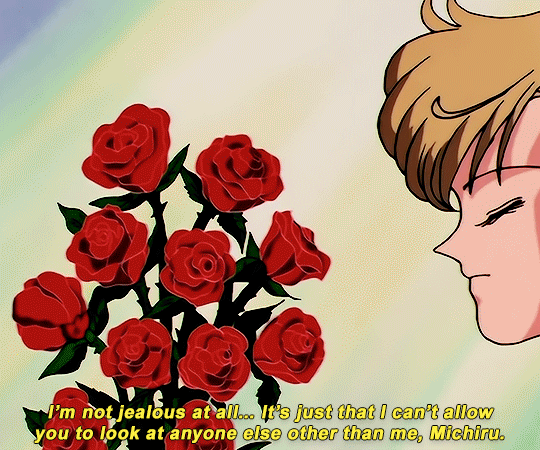
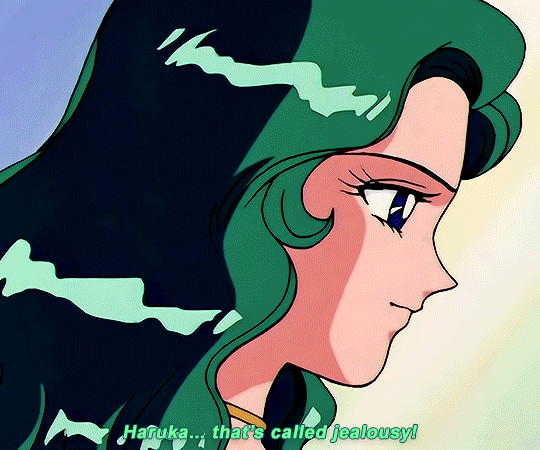
SAILOR MOON S: Episode 18 - 「芸術は愛の爆発!ちびうさの初恋」
#animeedit#sailor moon#sailormoonedit#oldanimeedit#harumichi#haruka x michiru#smedit#wlwedit#haruka tenoh#kaioh michiru#ep 107#bssm#bssmedit#pretty guardian sailor moon#bishojo senshi sailor moon#sailor neptune#sailor uranus#michiru kaioh#tenoh haruka#HI YES THIS BLOG IS ALIVE im trying to juggle trying to make gifs for this sideblog and the other fandom one lol#i had to change some of the translation bc the context was slightly wrong...#japanese is such a hard language to translate into english sometimes#also coloring anime is so difficult sometimes im really not used to it#especially old anime haha
2K notes
·
View notes
Text
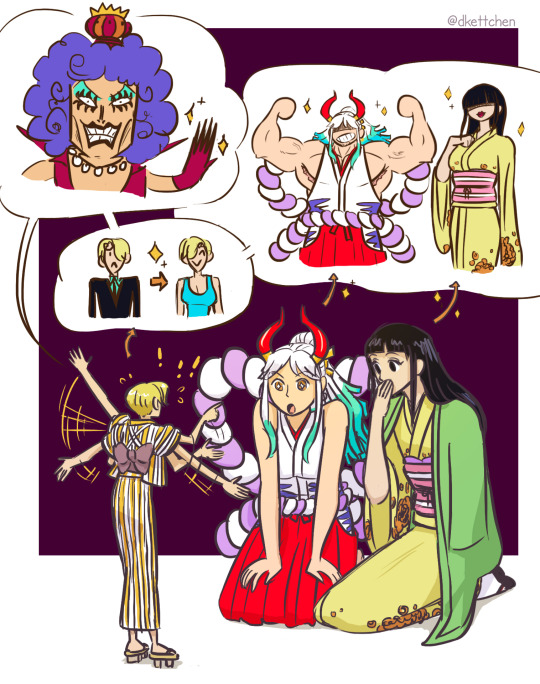
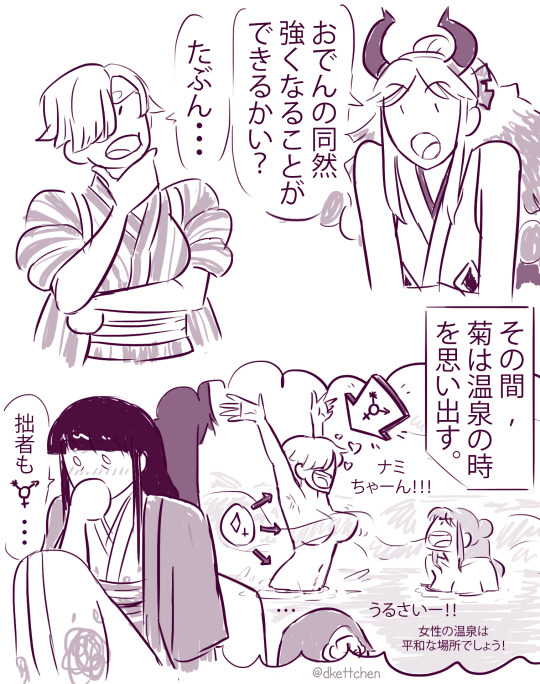
she would've told them unlike her canon! version who decided not to be an ally smh
#one piece#trans!sanji#sanji#kiku#yamato#ワンピース#I'm practicing my japanese shhhhhh#(日本語のペラペラ人:俺は文法とか書く方とか間違ったら教えてください😅ありがとうございます)#translation:#Yamato: I'll be able to get as strong as Oden?#Sanji: Probably... 🤔#[meanwhile Kiku is remembering the time in the hot spring]#(Sanji: Nami-chan!!!)#(Nami: Shut up!! The women's bath is supposed to be a peaceful place!)#Kiku: I am also ⚧️ ... o.o#(y'all english speakers had me all to yourselves for a decade it's about time I start to also sometimes make stuff in my next language lol#notably for media *from* that language#same as it made sense to make fan content in english for [american superhero franchise we don't talk abt anymore] back in the day#(happy seasonal reminder that Ren Is Not A Native English Speaker and This Is My 5th Language hi 😅))#while looking up reference for this I learnt that the straps to tie back the kimono sleeves are called tasuki#also I decided yamato get big muscles cause he got them kaido genes in im (I also gave him his dad's young-man-facial hair)#the more I do transition projections for one piece characters while tryna adhere to the style the more I learn that sometimes stylisation#uses bones less as literal determinants for where things go and just kinda exaggerates shapes based on vibes alone instead#meaning trans characters' bones wouldn't literally stay looking the same in that stylisation in the way they do irl#they'd get exaggerated differently based on what the surrounding stuff is doing#I still think oda's transition demonstration when we first met iva was unreasonable even with that in mind tho
2K notes
·
View notes
Text

Benefits of learning Japanese
The Japanese market is the third-largest in the world. It has a highly stable economy and enormous purchasing power. Yet, not all companies think of Japan first when they decide to go international. One of the strong reasons behind this hesitation is the cultural differences and language.
#Japan in Japanese translation
#Japanese language translation#Japan in Japanese translation#Japanese software localization#Japanese website localization#Braahmam International
0 notes
Note
have you seen the commentary from the p5r artbook going around? the shuake part of my dash is losing it a bit at the implication that their wishes were mutual!!! that seems to be what some people are getting from the commentary at least… amy insights?

Hi! I have been through the artbook. It's great, isn't it? :D
The image above is called "One Ending", and the creator caption (by illustrator Akane Kabayashi) reads:
When I think about how Akechi's wish was to play chess after school with the protagonist, I almost want to call him out with "You liked him after all, didn't you!"
Look at that. We're told about Akechi's wish, and what it included. We're as good as told outright that he likes Joker—and this isn't the only time, there's also this:


—There are a whole lot of things we can imagine, based on how the protagonist was depicted as someone special to Akechi. Those are more or less the exact emotions represented during Akechi's confidant. (Mumon Usuda, chief designer)
"someone special" here is 特別な存在 tokubetsuna sonzai—literally "a special presence". It means a special person, and more than that; it describes someone you find compelling, someone you can't look away from, someone who becomes one of your most important people, the centre of your world. It's another term that is often romantic, but isn't necessarily romantic.
(In the same way, I think Kabayashi's suki jan! is more tongue-in-cheek than it is a cast-iron confirmation that Akechi was canonly in love with Joker. The language there is teasing, it's ambiguous, it's baity; Kabayashi is joking. This is a rank 6—as they say, if you know, you know. But it is of course ultimately up to all of you.)
There's another mention of this image, down in the creator interview:

Out of all the Maruki ending illustrations, it was Akechi's that stuck with me the most. It made such an impression to see them opening up as friends, having a fun, peaceful time together like high school students should. (Mumon Usuda, chief designer)
What really strikes me in all of this is the emphasis the creators put on the fact that this is Akechi's illustration, Akechi's wish. Because I've thought for a while that we know Akechi has a wish. You can see him struggling with his refusals to Maruki in the first week of January. And you can hear his wish spoken—when Maruki repeats it back to him, during the boss fight, on 2/3:
Maruki {F1 81}君たちとなら、君も過ちのない道を歩めるかも知れないじゃないか! {F1 81}-kun-tachi to nara, kimi mo ayamachi no nai michi o ayumeru kamoshirenai ja nai ka! If you're with {F1 81}―kun and his friends, you could begin to atone for what you've done! Think about it! With [Amamiya]-kun and his friends beside you, you could choose a path with no mistakes as well!
So this wish has several parts. First, there's that kimi mo, "you also"; it's tempting to read this as Maruki also wanting his new world to erase his past mistakes. Second, there's the first part, "if you're with [Amamiya]-kun and his friends". Where to even start here?
Being with Joker and the others is a prerequisite for the second half of Akechi's wish. It doesn't just coexist, it enables the rest of it. Just like his words in the engine room, "I wonder why we couldn't have met a few years earlier, [Ren]..."
Remember, Akechi's whole arc is about his rejection of trust and friendship, and his insistence on doing everything himself. This is precisely what Futaba calls him out on—"you trusted no one", or "you played life in single-player mode". This is what he unlearns at the climax of the engine room, when he realises he isn't prepared to let the others die—and follows through to save them.
Akechi is nothing without others, and he knows it. Without their support, which he believes he has no right to, he has no hope of living a better life, even were he to be given the chance—and he knows that, too. He has learned, and he has grown—and yet he knows the things he needs and wants so badly are forever inaccessible.
And his wish is about all the Phantom Thieves, not just Joker. There are many tiny references to this end—not least the original Japanese rank 10 line for his confidant, where he sacrifices himself for all of you. Joker is his compelling presence, his someone special, but he's formed small bonds with the others too, God help him.
and then there's the crime thing
The localisation frames Akechi's wish in terms of atonement, but that's not what's on offer. You cannot, after all, atone for things you never did. We see Akechi's wish put into practice, in the Maruki ending, where he appears with his friends beside him, wholly innocent and with unstained hands. And we see it in the first week of January, after he has finally met Maruki and spoken to him:

Akechi: Ah, that reminds me—there was one more thing I wanted to tell you. Akechi: About the reality Maruki's put us in... Akechi: It seems that Okumura and Wakaba are both considered alive by all accounts. [Ren: They're not dead anymore? / What do you mean?] Akechi: They aren't mere illusions, or cognitive beings—they truly are alive and existing in this world. Akechi: In fact, their deaths seem to have never taken place at all in this reality. [Ren: What happened to Shido?] Akechi: Shido was the only one arrested on the crime of attempting to overthrow the government... Akechi: It seems the Phantom Thieves were causing a stir in this society as well, but there's no record of your arrest now. Akechi: Basically, in this reality, you and I haven't committed any crimes.
While Akechi still remembers his crimes, they never took place. They have been undone, and only his lingering memory—and Joker's, at this point—speaks to them. He objects to this on countless levels, he summons all the strength he has to refuse it, but don't make the mistake of thinking that means he doesn't want it. This is Akechi's wish in action.
People are often very certain that Akechi's resolve in the third semester is like iron—that he rejects Maruki's offers right away, is never tempted, never wavers. But that can't be true. We know he's afraid to die. We know about the bad end where you don't complete the Palace, where Akechi says nothing and stares at the floor, seemingly blaming himself internally while all the others blame themselves aloud, for being unable to say no to Maruki's temptations. We know how he responds to this assertion of Maruki's—Maruki, who has perfectly summed up what we know all the other PTs wanted, and who (even if Word of God hadn't just confirmed Akechi's wish) we have, honestly, no reason to doubt.
Because Akechi never refutes this wish that Maruki describes. He never says he doesn't want it. He just rejects it—like all the others, who so desperately want what Maruki could give them. Futaba's mother, Haru's father. Akechi's life, and his innocence. And the people who might have been his friends, if he could dare, one day, to ask.
Akechi is tested just like the others, and the price he pays for his defiance is perhaps the highest of all.
and finally
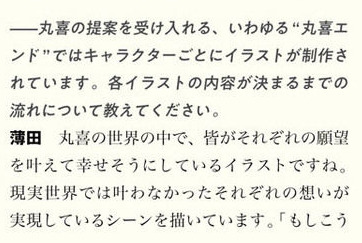
[The Maruki ending illustrations are] of Maruki's world, where everyone's wishes are granted and they seem happy. The scene shows their actualised wishes, which were never granted in the real world. (Mumon Usuda, chief designer)
We shouldn't forget the price Akechi pays for his impossible wish. Sure, the vision of himself being altered like Sumire clearly haunts him, and I'm sure it made the choice easier—but I don't think it made it that easy. Instead of taking the dream Maruki offered him, Akechi chose to face up to what he'd done, and who he'd become; at the very end, in the third semester and in the engine room, he always makes the right choice.
And that choice was taken away from him. Agency over his life and death, his own acts, and who he would even be—Joker and Maruki take it all away from him and make him a puppet, just like Shido.
Maruki's ending isn't pretty.
revision history
Click here for the latest version.
v1.0 (2024/03/29)—first published.
#asks#persona 5#p5 meta#things i translate#japanese language#word of god#shuake#goro akechi#takuto maruki
632 notes
·
View notes
Text

#Quackity#Qlobal Translator#Temporary tag for now#This is seriously so cool I'm glad I was right about the Translation tool thing#Can't wait to see this being used#And I'd love to see Arkanis use it#I hope it's something that many streamers can / will use#I was celebrating Dia de los Muertos with family yesterday and missed this entire stream / announcement#But I got pinged about it and immediately watched this video then pulled my cousin aside and was like#''Look at this cool thing our little primo is doing''(#Not related obviously but it's a running joke in our family)#Whenever we see a fellow Mexican doing well or doing something cool we go ''That's our primo!''#I'm entirely at fault for starting that trend#Anyways#November 3 2024#Got a big smile on my face when I heard SushiRamen talking I was like !!!!! I know that language!!!!#Man I should start listening to some Japanese streamers sometime
189 notes
·
View notes
Text
[ENG SUB] JokerOutSubs x Backstage z Jano Morelj collab: The Voices of Two Generations (14.10.2024)

Bojan and Tomi Meglič’s interview with Jana Morelj is now up on her YouTube channel, ‘Backstage z Jano Morelj’, with captions in English, Serbian, Croatian, Italian, Finnish, Hungarian, Japanese, Polish and French by JokerOutSubs!
Massive thank you to Jana for collaborating with us on this one so we could make sure the fanbase could watch it as soon as possible - please go and check out/follow her on Instagram and Facebook!
And a huge thank you to every member of JokerOutSubs who worked on this- keep an eye out, our amazing translators will be adding even more languages SOON!
Watch the full video with subtitles here!
Full credits under the cut:
Slovenian and English captions:
Transcript by: Anja (@kurooscoffee), Drumbeat, Katja (TT katysmusic77), Maša (@ilikethingsandsuch), Smarty (@chaosofsmarty), Sabina (X coffeebiscuitxx), Tara
Translation by: Anja, Drumbeat, Katja, Smarty, Sabina, Tara
Review by: Anja, Tara
Proofread by: Anastasia, Grace (IG gboleyn123), Shau (@flowerlotus8), Ry (X klámstrákur)
Subtitles by: Anja, Drumbeat, Iris, Tara
Other languages:
Serbian and Croatian: Irena (IG irenalemajic), Marija (IG marija_rocen), Mia (IG mia_djordjevic_ig), Moon (@moonlvster)
Finnish: Katja (IG katbatx), Niina (IG niini5_93), Saara (IG s_aaaraa)
Hungarian: Anna (X ddrflctns), Tami (X brnbergeron)
Italian: Irena (IG irenalemajic), Val (@vesdagrem)
Japanese: Michael (X mic_rr_1203), Sae (X sae_w)
Polish: Aneta (IG z_aneta_z), Klaudia (IG flowers.s08), Ola (IG a.oki_), Zielonaherbata (IG zielonaherbata_)
French: Magali (@yoda-bor) and Mappyon (X UchuuRaion)
Video graphics: Val
#joker out#bojan cvjetićanin#bojan cvjeticanin#tomi meglič#siddharta#jos: collaboration#year: 2024#jo: bojan solo#og language: slovenian#translated language: serbian#translated language: croatian#translated language: italian#translated language: hungarian#translated language: japanese#source: backstage z jano#translated language: finnish#jokeroutsubs x backstage z jano#type: video#translated language: polish#translated language: french
86 notes
·
View notes
Text
forewarning that this is mostly just an observational ramble
one thing I've gathered from looking around older western fantasy otaku sites is that, presumably in large part because of the order in which things entered mainstream consciousness, sauron is talked about pretty consistently as the final boss of the lord of the rings
technically, this is true of everywhere, but I want to emphasise that it is extremely common to see younger fantasy otaku a decade or two ago use ラスボス when explaining who he is, as a primary descriptor
[before going any further on this, it probably bears mentioning that the japanese translation of lord of the rings is a bit divisive. when it comes up, it's either in the context of how impressive the translation is (skews older) or in how unreadable it is (skews younger), because it's translated into antiquity prose. apparently exceptionally so, even for a fantasy novel, so it was very much extreme nerd shit]
a big part of this is, of course, just the idea of the final boss having more awareness than tolkien at the time the movies were coming out. I imagine almost the exact same thing would happen more or less anywhere that video games hit mainstream nerd awareness before tolkien did, but there's something else that I think might have something to do with it, because if you're looking at old enough threads, you notice that not only is sauron being explained as the final boss, but this is being mentioned in contrast to morgoth not being the final boss
which seems a bit random (morgoth doesn't exactly come up enough in lotr proper to cause this confusion), if you don't know that angband, where morgoth is the final boss and sauron is just the midboss, was pretty popular with western fantasy otaku. well, popular in the way that cult classics are, but you know how it goes
with that in mind, it makes sense that it was (at one point, before tolkien was more accessible through other channels) something people called each other fake fans over
so in a kind of interesting way, namedropping sauron in fantasy otaku spaces that skewed younger (for a time) was almost equivalent to namedropping morgoth in western fantasy nerd spaces. that all kind of stops being the case once you have the peter jackson movies immediately at hand, though
there's also the fact that, because it's a little harder to read lord of the rings in japanese, someone who's casually into the book is much more likely to also go ahead and read the silmarillion, which helped rings of power get incredibly popular with older audiences in japan when it came out. as a fun side effect of all this, there's a bit more morgoth x sauron shipping around
#also should be clarified that the specific way that tolkien is translated in japanese is like#seemingly made to create a generational divide in people who have strong opinions on whether you should use kanji in western location names#same argument as always: do you translate for western sound or period-appropriate language#and its answer is a resounding 'both'
173 notes
·
View notes
Text

I've been training my whole life for this
#japanese#langblr#anime#all according to keikaku#studyblr#language#kanji#keikaku means plan#also the review question wasn't just that haha#it asks you for the kana first#and then the translation#or you get the translation or the kana#and then you have to write it
111 notes
·
View notes
Text

I was reading DunMeshi and was so confused by this phrase that I decided to look it up


(Do correct me if you think this isn’t accurate cuz I just used google)
But I find it frankly hilarious that Chilchuck is using slang from various parts of the British Isles out of nowhere in the last volume??
(I’ve now had someone explain to me that apparently it’s not uncommon for certain uncommon types of informal Japanese to be translated as slang from specific areas, typically around Britain, in English)
First of all I’d alr seen people jokingly headcanoning him as Irish on here (which was an idea I absolutely love)
ALSO I come from a part of the UK where I’m very familiar with the term ‘git’ but had never heard of a version with an e and I also had no idea it meant the same as ‘bastard’
(I have considered that this could just be the regular meaning of the word ‘get’ but I thought it wouldn’t grammatically make sense here so I assumed it was slang esp cuz he would totally call someone a git)
Anyways I’ve checked other translations and it’s not the same so I find it so funny that this one (which I’m pretty sure is the official English translation) included it

(^ another version I found online)
Anyways this is the translation I have and used as an example for this post, which I’m pretty sure is the official English translation:

Edit: Btw also check tags I kinda wrote this when I was drunk on sleep deprivation
#just love the idea of Chilchuck being at least a non-English Brit (or like from somewhere on the isles to include Ireland)#Irish Chilchuck#British chilchuck#ehem#imagine a dub that had him with an Irish accent and Senshi with the Scottish one he’s sometimes given#WE WERE ROBBED /nsrs#alas#most dubs are always just gonna be full of American accent#anyways back to relevant tags#dungeon meshi spoilers#chapter 92#(I wouldn’t consider thsi major spoilers since it has no context but gotta be careful)#dungeon meshi#chilchuck tims#chilchuck#dunmeshi#delicious in dungeon#dunmesh#chilposting#chilchuck posting#shitposting#shitpost#random thoughts#not important#I also thought it might have something to do with the original Japanese#which is why it’s funny that some translations just don’t include it#this is probably a massive reach looking back on it cuz I was really tired when I wrote this 😭#regardless of the specifics#I was just interested by the sudden use of slang/informal language#lesbianslovenamari
54 notes
·
View notes
Text
I’ve been having trouble putting this idea into words so you’ll have to bear with me, but I was struck when I saw a Japanese news program interviewing foreign tourists in Japan, and some australian women were dubbed over with a stereotypically feminine speech register (lots of のs and わs), and my first thought was “they weren’t speaking that femininely in english”.
A friend of mine from the UK recently mentioned that he noticed that australia has a generally more masculine culture than england - he felt that everyone is a bit more masculine here, including women. This kind of confirmed to me that my impressions of the dubbing were right - the tourists were speaking in a relatively (internationally) more masculine way. Yet their dub made them sound so much more feminine.
It made me wonder. When translating something, do you translate the manner of speaking “directly”, or “relatively” in terms of cultural norms? Maybe this graph will help me explain the question.
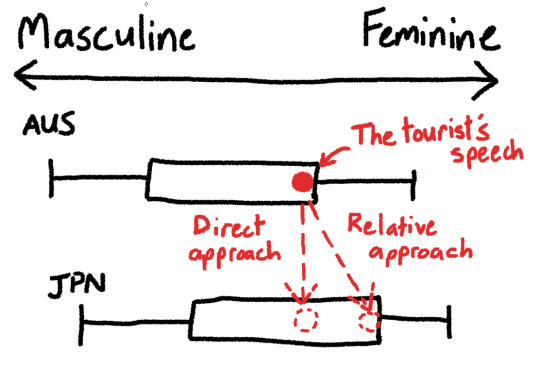
A direct appoach in this case might appear to a Japanese person to result in an unexpectedly masculine register, but preserves how the speaker's cultural upbringing has influenced their speech.
The news program translators chose the relative approach - I think I would prefer the direct approach. I think I prefer it because I believe translation should be a rewriting of the original utterance as if the speaker was originally speaking the target language, and the direct approach compliments that way of thinking the best.
Actually now that I type that, I’m second guessing myself. Does it? It does, if for the purposes of the “rewrite it as if they spoke japanese” thought experiment, we suppose the speaker magically learned japanese seconds before making the utterance, but what if we suppose the speaker magically grew up learning japanese - then maybe they would conform to the relative cultural values. But also, maybe they would never have said such a thing in the first place - their original utterance was informed by their upbringing and cultural values, so how could you possibly know what they would have said if they had known japanese from birth? Maybe my initial instinct was right after all?
If you work in translation, I’m very interested to hear if you have come across this problem and how you deal with it 🙏
Further reading: I think this question also ties into this problem I’ve been struggling to answer for a while.
#linguistics#language#langblr#japanese#japanese language#translation#jimmy blogthong#official blog post
1K notes
·
View notes
Note
I love 2p japan
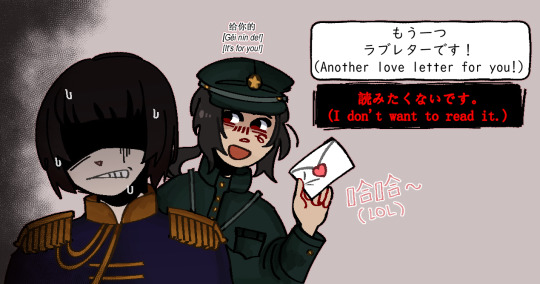
CHINA: 日本さえ恋がしたいということ、考えられないことではないねぇ。(It’s not unthinkable that even Japan would want love, right?)
JAPAN: 闭嘴。(Shut up.)
#hetalia#hws china#hws japan#aph china#aph japan#2ptalia#2p hetalia#china speaking in japanese just to make japan mad so japan responds in chinese just to retaliate LOL#as always please let me know if theres any errors with the translations! with regards to japanese esp since i always want to improve it.#i am totally lost with chinese however so i am forced to rely on short simple phrases that are easily verified... such as shut up.#and its always so fun to read about other languages. like apparently italians dont use many acronyms#and korean has a tendency to just drop pronouns and make you infer the subject... according to my bro who is studying it currently.#ENOUGH ABOUT REAL COUNTRIES LETS TALK ABOUT HETALIA !!!#with regards to china... i really want to make him kind of floaty strange offputting... hes so old and hes seen so much...#a mix between 'ive seen so much it doesnt matter' and 'you never really go numb'...#but hes also silly and a little volatile...#yeah hes smiling but inside hes [GLASS SHATTERING SFX] What was that..#china isnt well elaborated upon even in canon so im excited to put him thru the wringer here...#he should constantly have a smile and dead eyes. ouo <-- like this#hes so old you guys hes so tired.#anonymous#2p china#2p japan#ask
61 notes
·
View notes
Text
#i saw someone talking about how they had copies of the same book in multiple languages and i was like.... why tho#like i get collecting multiple language editions of a favorite of yours#but this was presented as specifically for reading in other languages#idk am i the odd one out here?#i will not read anything translated Into Japanese#the way i look at it is that i learn languages to get a deeper understanding of the author's original intent#but as of right now theres still a little bit of a language barrier#translation is already a type of barrier between you and the original work#so why would i want to be twice removed from what the author is saying#languages#langblr#studyblr#language learning#benkyou posting#polls#memes#studyinspo#polyglot#the only reason i can see myself reading a book translated into japanese is if i really want to read it but japanese is the only#available language i know#but even then#i always have so many books to read that it really wouldnt make a difference if i either a. read it or not#or b. waited for it to be translated into english#i do know that im weird about translations though
245 notes
·
View notes
Text

Japanese language translation
The Japanese market is the third-largest in the world. It has a highly stable economy and enormous purchasing power. Yet, not all companies think of Japan first when they decide to go international. One of the strong reasons behind this hesitation is the cultural differences and language. The Japanese market is also a quality-sensitive and mature market. They are used to consuming high-quality localized products. They also have limited English proficiency. It makes localization a near-mandatory step to even enter the market. And, you’d have to aim for perfection, no less, to begin to register on the Japanese consumer’s mind.
#Braamaham international#Japanese language translation#Japanese localization#Japanese software localization#Japanese translation#Japanese website localization
0 notes
Note
Idk if you’ve talked about this before, but in the event where ren and akechi are playing that shooting game together there is a very funny interaction and my fellow shuake fans and I are unsure what it means.
In English, Akechi jokes that he’s practicing gunplay to take ren out. Clearly this could either be a murder joke or a date joke. In Spanish, he apparently uses a phrase that can only mean a date.
What does he say in japanese? Was it ambiguous there too or was it clearly a murder joke or date joke? Again, sorry if you already explained it lol
…also this is kinda awkward but was the usage of the term gunplay intentional or does it have multiple meanings and fanfic has just ruined me orrr…
Hello! I am so happy to be able to go over this with you. Many thanks to @platinumdream, @minkhollow42, @somethingpersonarelated and the r/spanish subreddit for verifying this one for me.
This line stands out because the Japanese and English (and also the Spanish) translations are all radically different—different enough that what we have here is a stellar example of "the Xerox effect".
Let's take a look.
the scene in japanese

Akechi 気付いた? そうだよ、いつか君も懐に忍ばせたこれで⋯ kizuita? sou da yo, itsuka kimi mo futokoro ni shinobaseta kore de... [lit. you noticed? that's right, some day <see below>...]
Let's take a quick look at the grammar of this line, which I think is dual-meaning in Japanese just as it was in English (and if any of this seems like bullshit please get in touch, as it never ends well when I try to produce sentences of my own):
Akechi does not finish this sentence—he's left off the verb. So, as often happens with him, his meaning is ambiguous. Let's take the obvious one first:
いつか君も懐に忍ばせたこれで【ある】 itsuka kimi mo futokoro ni shinobaseta kore de [aru] Some day you, too, will have one of these concealed in your pocket.
Short and sweet: "I carry one of these, concealed, and some day you will too". Note that there's nothing here about practicing, as there is in the English.
But there's another possible meaning here:
いつか君も懐に忍ばせたこれで【撃ってあげる】 itsuka kimi mo futokoro ni shinobaseta kore de [utte ageru] Some day I'll [shoot] you, too, with this thing concealed in my pocket.
WELP. Like I say, I'm not entirely sure, but I do think the strong likelihood is that this dual meaning exists in Japanese.
I should say I don't think there's necessarily a suggestion here that he carries an illegal gun (though since Naoto has one in P4, it's very possible)—I think it's a metaphorical pocket, his inventory in the Metaverse.
Though I don't think this is really what's going on, there are also a startling number of idioms with futokoro that suggest embracing....
but what is the futokoro?
Idiomatically speaking, 懐 futokoro often translates pretty cleanly as "pocket". But something else is going on: your futokoro is explicitly your breast pocket.
Originally, it was the flap in the front of your kimono where you tucked things away. And so it also appears in a lot of idioms relating to the bosom, or the heart. 懐に飛び込む futokoro ni tobikomu is to throw yourself into someone's arms. 懐に入る futokoro ni hairu, for instance, means to worm your way into someone's affections, or to win someone's confidence—sound familiar at all?
But there's something else going on, of course, with Akechi concealing a weapon in his breast pocket:
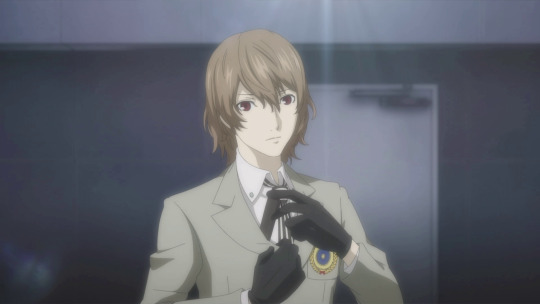
Yep. Here's the payoff for this line in rank 5. Akechi tucks that silencer away in his breast pocket—just like he told Joker he would. And then he laughs. So did he know at rank 5 that this was going to happen, or did he bring this up for some other reason? Well, you decide.
By the way, here's Joker's question about gunplay:
Joker 撃ち慣れてる? uchi nareteru? Are you used to gunplay?
The Japanese just means "Are you used to shooting guns?"—I'm not sure it has any of the more, er, fanfic connotations of the English "gunplay". @specterthief agrees there doesn't seem to be any innuendo to the Japanese line.
the scene in english

Akechi: Ah, you noticed? Well, I'll need as much practice as I can get if I'm going to take you out.
Let's look at what's happening here, because it happens very often. Like much of Akechi's dialogue, this line in rank 5 was originally a double entendre—it has a very obvious, and relatively innocuous, meaning, but if you squint, you can see Akechi is hinting at something far less innocuous.
Wordplay of this kind takes a lot of time, thought and skill to translate. So what happens in practice is that the translator has to choose one meaning to put front and centre. The English translator has decided, very reasonably, that Akechi's implied "I will kill you" is more important than the joke about the concealed weapon.
To be clear, this was probably the right call. I love the relative subtlety of the Japanese and the 11/20 callback, but it's important that people playing the game understand what's going on—even if, over here in blorboland, it's clear that He Would Not Fucking Say That.
the scene in spanish
Do sit down.
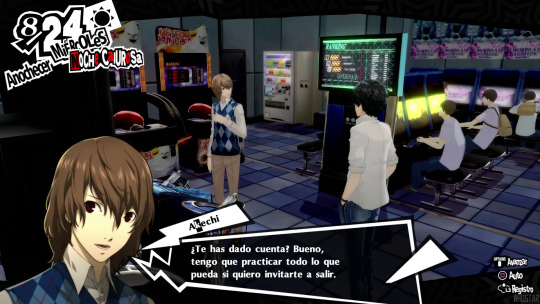
Akechi: ¿Te has dado cuenta? Bueno, tengo que practicar todo lo que pueda si quiero invitarte a salir.
Now, I need to be as up front as I can possibly be about the fact that I do not speak Spanish. But I know a lot of people who do, and they have responded with one voice:
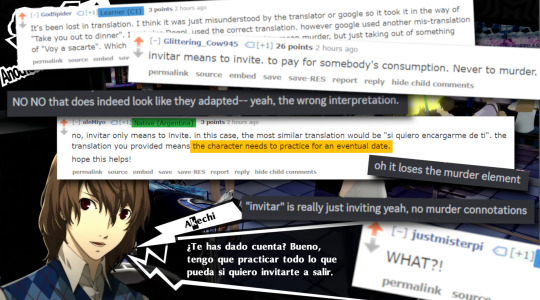

...
"Ask you out"? "ASK YOU OUT"?????
This is what is meant by "the Xerox effect".
We start in Japanese, with the relatively subtle "I have a concealed weapon", which becomes "I'm going to shoot you with a concealed weapon" if you think about it a little more. Then, in English, we become more blatant, with "take you out" having the up front meaning that Akechi will shoot Joker; rather than being subtext, it's now the point of what he's saying. And it's introduced something new—the alternate alternate meaning, of "take you out [on a date]".
It is possible that the Japanese line has a third meaning, very similar to this reading of "take you out"—you would have to torture the context here to get dating from the English, in the same way you'd have to torture the Japanese to get embracing from it.
But there's no torture in the Spanish. Oh, no. Spanish Akechi, as they say, just fucking goes for it. and why the hell not.
but what happened here?
The Spanish localisation is an indirect translation, translated not from the Japanese original, but from the existing English translation. It retains any and all errors in the English script because of this. And when the Spanish translator looked at this line of Akechi's, they saw not the original Japanese dual meaning, the one the English translator saw, but the one the English translator introduced—the dual meanings of the English "take you out".
And the Spanish translator, again, had to choose which of Akechi's seeming dual meanings to keep. Should they keep the line about shooting Joker? Or should they keep the line about taking Joker on a date?
Just like photocopying a photocopy, detail and accuracy are progressively lost, and errors accumulate. Of course, these indirect translations are not without their positives—translating from English allows for a far wider range of translations to be done quicker and more cheaply. Without them, far fewer languages would see official translations at all.
Also, it's really funny and that Spanish translation is a gift.
revision history
click here for the latest version.
v1.1 (2024/01/11)—confirmed no innuendo on uchi nareteru.
v1.0 (2024/01/10)—first posted.
#asks#persona 5#p5 meta#translation#japanese language#spanish language#(what)#shuake#goro akechi#ren amamiya
250 notes
·
View notes